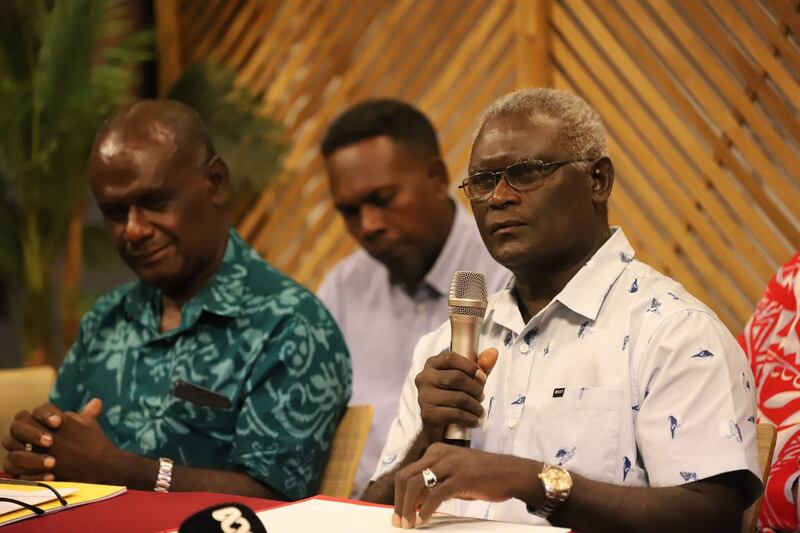The Solomon Islands’ new prime minister, Jeremiah Manele, has promised an aggressive approach to improving the economy after a national election last month showed widespread frustration with falling living standards.
Manele, who was foreign minister in the previous government, was elected by a secret ballot of members of Parliament on Thursday. He replaced Manasseh Sogavare, the combative pro-Beijing leader who attracted international attention to the Pacific island country of 700,000 people by pulling it into China's orbit.
Speaking outside the Parliament building in Honiara, Manele called on Solomon Islanders to respect the democratic process and not resort to the violence that has followed previous elections.
“Our economy and livelihoods have suffered because of this violence. However today we show the world that we are better than that,” he said. “We must respect and uphold the democratic process of electing our prime minister and set an example for our children and their children.”
Manele’s governing Ownership Unity and Responsibility Party won 15 of Parliament’s 50 seats in the Apr. 17 election.
Combined with coalition allies, independents and apparent defections from the opposition camp, it was able to secure 31 votes for Manele’s election as prime minister. Opposition leader Matthew Wale got 18 votes. One member of Parliament wasn’t present for the voting.
Sogavare announced earlier this week he would not seek the prime ministership. Under his leadership, the Solomon Islands switched diplomatic recognition to China from Taiwan in 2019 and signed a secret security pact with China, alarming the United States and its allies.
The election and Parliament’s choice of prime minister has been watched by governments from China to Australia and the U.S. as they jostle for influence in the Pacific.

Analysts have said Manele is regarded as a more moderate figure than Sogavare, but is unlikely to spurn close ties with China. Earlier this week, Manele said he’d continue the country’s “friends to all, enemies to none” foreign policy if elected.
For many observers, the election has been the most consequential for the Solomon Islands in a half century since independence and a test of Sogavare's embrace of China. The superpower rewarded the nation with showcase sporting facilities for the Pacific Games and funding for members of Parliament.
However, going into the election, voters interviewed by RFA-affiliate BenarNews in Honiara and other areas of Guadalcanal said they were frustrated by the government’s ineffectiveness in providing basic services and were preoccupied by the daily struggle to earn enough to get by.
Crumbling roads and rundown health clinics were a common complaint as were high prices in mostly Chinese-owned shops in Honiara. In a village kilometers from the capital, one resident said he hoped the community could get bore water and proper toilets rather than having to dig pits in the ground.
The OUR Party’s underwhelming performance in the election “was primarily down to poor economic conditions which left voters frustrated,” said Terence Wood, a development aid and Melanesian politics researcher at Australian National University.
“Also, MPs had less money available to them to provide direct material assistance to their supporters and so they got turfed out at a higher rate,” he said.
A recent report by the Solomon Islands’ central bank on the precarious state of the economy “is concerning and calls for a more focused and aggressive approach,” Manele said.
The report called for major reforms to improve infrastructure such as roads and boost the economic growth rate to a minimum of 5.0% annually. The Solomon Islands’ population has been growing faster than the economy, which means the average Solomon Islander is getting poorer.
“It is not an easy task but we will be reaching out to all relevant stakeholders as we progress on our road to recovery,” Manele said.
The economy, he said, had been damaged by the COVID-19 pandemic and riots in Honiara in late 2021, which were sparked by anger at the diplomatic switch and Sogavare’s leadership.
Priorities for the new government are possible revisions to the 2024 budget and laws covering special economic zones and the minerals and forestry industries, Manele said.
“No doubt Manele would like to focus on the economy but to some extent macroeconomic circumstances are beyond the ability of any individual prime minister to address,” said Wood.
BenarNews is an RFA-affiliated online news organization.

